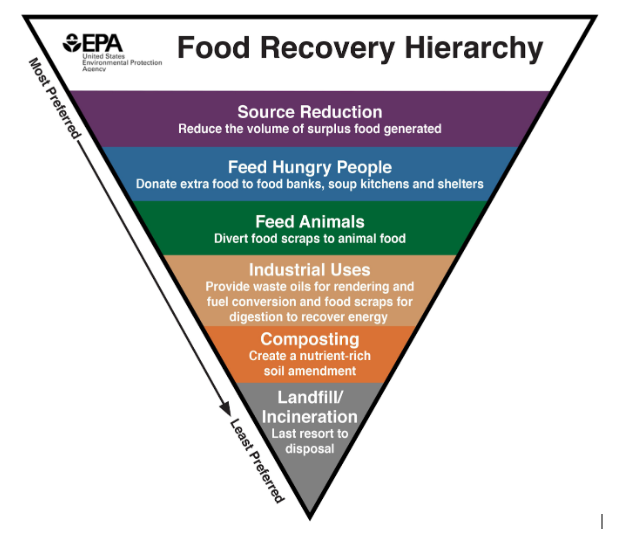Sustainability and State/Local Law
Republic is the approved solid waste, recyclable material and organic waste hauler for Clayton.
Information from Republic on how they are helping residents and business comply with SB 1383 can be found here.
Senate Bill (SB) 1383
New statewide organic waste regulations (SB 1383) became effective January 1, 2022 in California.
As the most aggressive waste reduction law to be adopted in California for the past 30 years, SB 1383 expands upon the requirements of AB 341 Mandatory Commercial Recycling and AB 1826 Mandatory Commercial Organics. However, SB 1383 is unique in that it impacts residents in addition to businesses, and it requires some businesses to donate excess edible food to feed people in need, in addition to diverting organic materials from the garbage.
All residents and businesses are required to not only subscribe, but also fully participate in, the three-container system of garbage, recycling, and organic waste (also known as compost). To learn more about how to participate properly, and avoid the possibility of being fined for placing materials in the wrong container, check out these helpful posters from Republic Services that demonstrate what items are allowed in each container.
The City of Clayton is currently collaborating with CalRecycle, Republic Services, and local food generators and recovery organizations to comply with SB 1383 and adopt the necessary strategies to implement organics recycling and food recovery programs.
Why is this important? :
From increased forest fires to worsening drought and rising sea levels, California is already facing the vast dangers of climate change. In response, the state is aiming to reduce the emission of super-pollutants by implementing statewide organic waste recycling and surplus food recovery.
Methane, a potent greenhouse gas that contributes to climate change, is emitted into the atmosphere when compostable materials like food, paper, and yard waste are buried in landfills instead of composted or recycled. Organic materials in landfills emit 20% of the state’s methane, a climate super pollutant, 84 times more potent than carbon dioxide. Everyone can do their part to reduce these harmful emissions by properly participating in the required 3 container collection service.
Environmental Benefits of Composting
Reduce Methane Emissions
-
- Landfills are a major source of methane, a powerful greenhouse gas, which is generated when organics decompose in landfills.
- Composting organics greatly reduces the amount of methane that would have been generated from landfilling organics.
- The use of compost also has numerous environmental benefits, including carbon storage, water conservation, and contributes to the reduced use of energy-intensive pesticides and fertilizers.
Backyard Composting
The second best way to curb your emissions is to compost on-site, or in your backyard. There are many benefits to backyard composting, including:
1) reduced emissions associated with transporting organics to an industrial site, and
2) homemade compost that can be used to nourish your garden.
Methods for Food Waste Prevention
There are still things that we all can do as individuals or businesses to help make a difference – such as preventing food waste or taking steps to keep food waste and other organic materials out of our landfills. Find tips for more purposeful shopping and cooking, and good food storage techniques here. Composting at home is also a great option.
Edible Food
Edible food is defined as food that is safe for human consumption. SB 1383 includes goals to get more edible food that would have otherwise been landfilled, to humans for consumption.
SB 1383 regulates two “tiers” of commercial businesses that generate edible food. Beginning January 1, 2022, Tier 1 generators must arrange for recovery of surplus edible food by establishing a contract or written agreement with a food recovery organization(s) or service. Beginning January 1, 2024, Tier 2 generators will be required to do the same.
Tier 1 Commercial Edible Food Generators
-
- Supermarkets;
- Grocery stores with a total facility size equal to or greater than 10,000 square feet;
- Food service providers;
- Food distributors; and
- Wholesale food vendors.
Tier 2 Commercial Edible Food Generators
-
- Restaurants with 250 or more seats, or a total facility size equal to or greater than 5,000 square feet;
- Hotels with an on‐site food facility and 200 or more rooms;
- Health facilities with an on‐site food facility and 100 or more beds;
- Large venues;
- Large events;
- State agencies with a cafeteria with 250 or more seats or total cafeteria facility size equal to or greater than 5,000 square feet; and
- Local education agency facilities with an on‐site food facility.
To learn more about how your business can comply with SB 1383 edible food recovery and donation, check out this brochure from Contra Costa County:
Countywide Food Donation Brochure
To view a list of local food recovery organizations that are accepting donations from food generators, click the link below:
Local Edible Food Recovery Organizations
For more information including model contracts, please visit the CalRecycle web page.
To learn more about how your business can comply with SB 1383 edible food recovery and donation, check out this brochure from Contra Costa County:

Commercial Edible Food Generator Requirements
-
- Recover the maximum amount possible of surplus edible food generated
- Partner with one or more food recovery organizations or services to pick up or receive surplus edible food
- Have a written contract or agreement with the food recovery organization(s) or service(s). Visit the CalRecycle website to read their Model Food Recovery Agreement to use as a reference when creating your own agreement.
- Safely recover edible food in accordance with the California Retail Food Code
- Track and maintain records of food recovered each month including type, frequency of collection and amounts in pounds
- Allow the County as the Enforcement Agency to review records upon request
Commercial businesses that fit one of the two tiers above, or other commercial businesses that want to donate edible food, should arrange for food recover by contacting the organizations listed by the County on their webpage, here.
Self-Hauling
Commercial businesses, including landscapers, that wish to self-haul their organic waste are required to source-separate food waste and landscaping from garbage. They are also required to keep records. To assist self-haulers with recordkeeping, CalRecycle has developed a tool that can be downloaded below: Self-Hauler Recordkeeping Tool.
Ordinance
SB 1383 regulations are being implemented in Clayton under Municipal Code Chapter 8.04 currently in effect. You can find the full Ordinance here.



